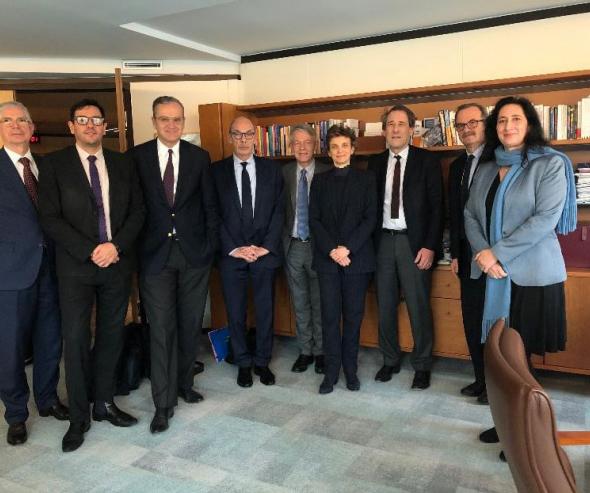Independent public and administrative authorities develop their collaboration on the challenges of climate warming

After the close of the 25th United Nations Climate Change Conference, the nine French regulators gathered at the offices of the French Financial Regulator (Autorité des marchés financiers, AMF) on 16 December 2019 to discuss incorporating climate objectives defined by the Paris Agreement into their strategic priorities and operational activities.
Their main conclusions:
Climate urgency is a major concern for regulation authorities
Meeting the Paris Agreement objectives requires far-reaching and irreversible changes in all economic activities, with far-reaching implications for society. These essential changes needed to fight climate warming and to adapt our economies, like the opportunities and risks they involve, are key factors in regulation. Regulators thus must be able to accompany these changes and light the way for society, which is demanding a response on these issues.
The authorities are using the tools available to them and addressing shared issues: offering companies incentives, keeping the public well informed and combating greenwashing [1]
To varying degrees, the authorities’ mandates involve climate objectives, and in this framework, they are already using their tools to intervene (by raising awareness and monitoring regulated parties, defining recommendations and rules with incentives, etc.). Through data-driven regulation, regulators can also reduce information asymmetries, give companies positive incentives, and help public authorities and private parties make decisions by providing information on climate risk and the impact of activities on climate.
Keeping the public well-informed is also a key priority. Even though the public is demonstrating ever stronger convictions about climate change, its knowledge of the overall issues and the deeper impact of its actions (as consumers of energy, goods and services, or as savers, etc.) is often limited. Meanwhile, consumers are confronted with increasingly widespread use of greening as a marketing point. Education and combating greenwashing are therefore operating priorities for regulators.
Regulators’ response to climate issues requires working together and sharing expertise
In most cases, climate issues are a new area of expertise for authorities, who have opted to take a network approach to the discussion by seeking to pool their resources and expertise. In order to formalise their discussions and report on their progress, the authorities will deliver their first conclusions in a joint document that will be published shortly.
A framework of regular dialogue and collaboration among authorities
The meeting on 16 December 2019 is part of a framework of twice yearly exchanges held by the presidents of independent administrative and public authorities since 2017 along with regular technical discussions, particularly on joint projects. Two joint discussions on connected speakers and vocal assistants (May 2019) and data-driven regulation (July 2019) have already been published.
At the 16 December meeting, the authorities also discussed the regulation of algorithms, following a study by the Autorité de la concurrence and its German counterpart, the Bundeskartellamt, and a case study by the CSA on an algorithm used to recommend videos on the Internet.
The meeting was also an opportunity to discuss the best practices to be implemented by regulators: applying rules of professional conduct when employees leave to work in the private sector, and managing privileged information from regulation activities that pertains to listed companies and could impact financial markets.
The participating authorities are the AMF, the Autorité de la concurrence, ARCEP, ARJEL, ART, CNIL, CRE, CSA and HADOPI.
[1] Greenwashing is the misleading use of environmental arguments to improve the image of a company or its products.